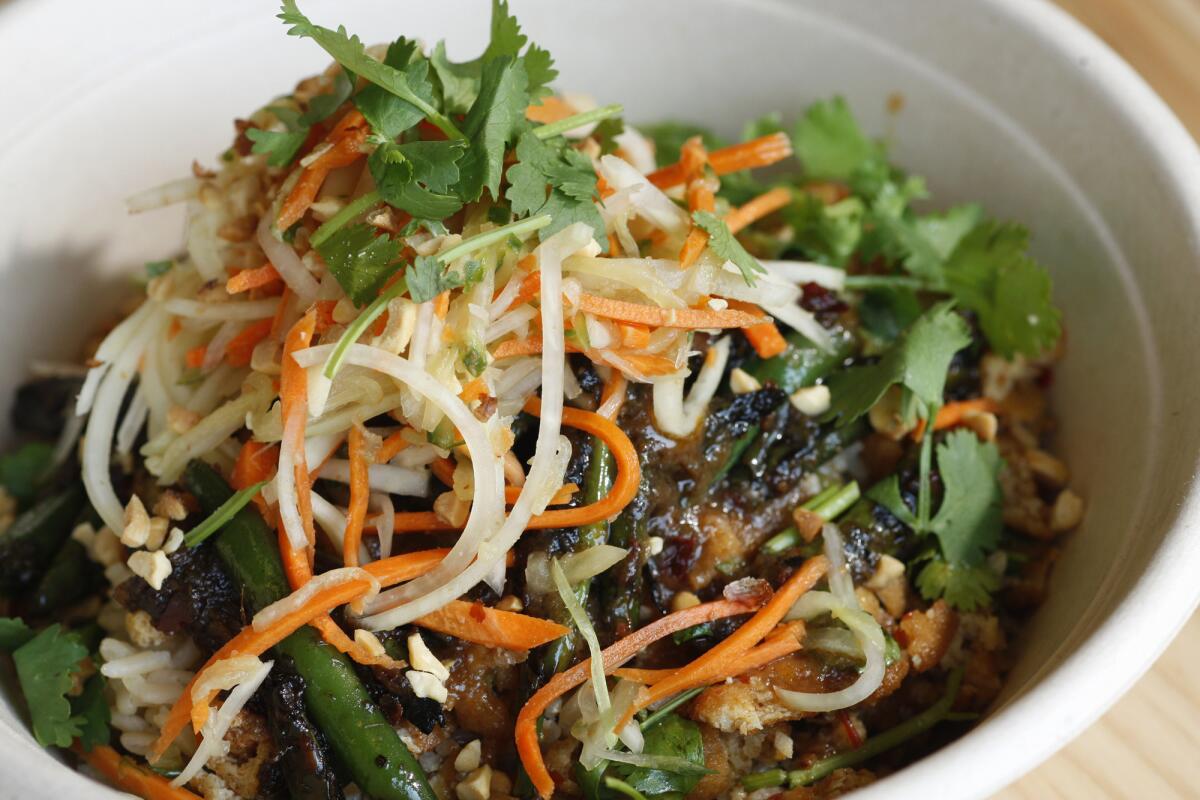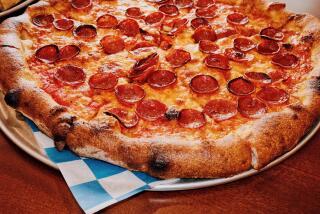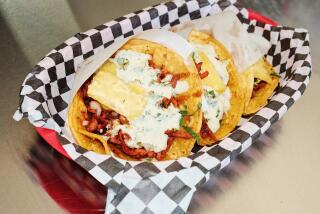ShopHouse offers gluten-free, dairy-free Asian dishes on the Chipotle model

Customers at the Hollywood restaurant ShopHouse occasionally remark, “Hey, this is like Chipotle.”
And indeed it is. ShopHouse Southeast Asian Kitchen, as it’s officially known, takes parent company Chipotle’s successful Mexican food format and translates it to dishes from Thailand, Vietnam, Singapore and Malaysia. And, with a menu that’s entirely gluten-free and dairy-free, ShopHouse has great timing: Many people have started to avoid those ingredients in a quest for diets that make them feel better or help them lose weight.
The name ShopHouse was inspired by traditional Thai buildings in which a family lives on an upper floor and operates a restaurant at street level. Particular shop houses get reputations for doing one dish really well, says Tim Wildin, the director of concept development at Chipotle and a native of Thailand.
As at Chipolte, ShopHouse diners walk along the food line, making their choices. In this case, it’s what goes in their bowls: rice or rice noodles or cabbage as a base, with meats, vegetables, curries and dressings, and garnishes (all dishes are less than $10). Toasted rice is used as a binding agent in meatballs; the only nuts are a small dish of peanuts for garnish. Nothing is deep-fried.
“The meal comes together like it would in a traditional shop house in Bangkok,” Wildin said one morning as the staff prepared for the lunch service. The restaurant on Sunset Boulevard, near the ArcLight Theater, opened in June. Another is scheduled to open this fall in Santa Monica, and there are two in Washington, D.C.
“This is another step in the gluten-free restaurant evolution that we’ve seen. To offer more fresh, healthy options for people who need food as their medicine, because people with celiac disease have no other choice, is exciting,” said Beckee Moreland, the director of gluten-free industry initiatives for the National Foundation for Celiac Awareness and the co-owner, with her husband, of the Sportscaster bar and restaurant in Lincoln, Neb.
Moreland was diagnosed with celiac disease 21 years ago, and she says it’s a “great experience” to be able to eat out “when you can concentrate on the conversation and the ambience” rather than worrying about whether you’ll be sick.
At ShopHouse, the lack of gluten — a protein in wheat, barley and rye — took little effort; flour was removed from one steak recipe, Wildin says. The menu began with a 2010 trip Wildin and Chipotle’s founder, Steve Ells, took to Southeast Asia. By the end, Wildin says, they were working on menu ideas on a cocktail napkin. Some of the recipes come from Wildin’s aunt.
Chipotle is a success, Wildin says, not because it serves Mexican food but because it is “tied to the use of sustainable ingredients that take hours to prepare but seconds to serve.”
And that idea works for the foods of his childhood too: the interplay of cold rice noodles topped with grilled meats or tofu and spicy vegetables cooked in a wok; the curries; the pickled vegetables or green papaya slaw and fresh cilantro. Thai basil, coriander, lemon grass, galangal, tamarind, turmeric and Kaffir lime flavor the dishes, along with some hot chiles and lots of shallots.
ALSO:
Singer Sarah McLachlan is actively creative
Food allergic diners balance on a knife edge
Tea’s health benefits exist, but many claims remain cloudy
More to Read
Eat your way across L.A.
Get our weekly Tasting Notes newsletter for reviews, news and more.
You may occasionally receive promotional content from the Los Angeles Times.











